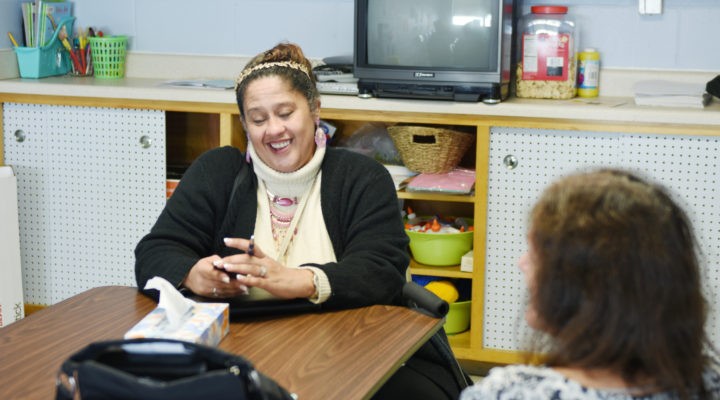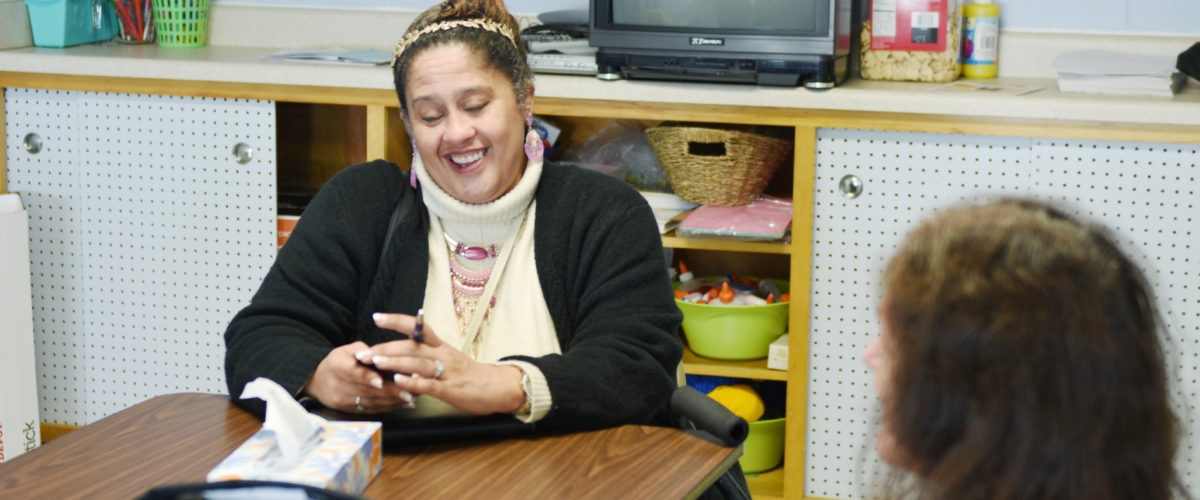Glynda Jackson is in the market for a job, and her life depends on it. “I have to work to live,” she explains. “I mean, we all work to live, but I literally have to work to live.”
That’s because Jackson survives with help from a dual-chamber pacemaker in her heart and a spinal stimulator, or “back pacemaker.” Forty-nine years have certainly been easier on most women, but Jackson has endured spina bifida, scoliosis, bradycardia, bipolar disorder and more — all thanks to heredity and half a lifetime of backbreaking, minimum wage jobs. She recently lost her Medicaid, which means she will have to make up the 20 percent of her medical bills that Medicare doesn’t cover.
And that’s only the tip of the iceberg.
Shortly after Jackson divorced her drug-addicted husband of nine years, she took refuge in Corbin, Kentucky, a quaint rail town on the western edge of Appalachia. Her mother’s family, including her aunt, resided there and would help her regain her feet. By that time, however, she was under a mountain of debt.
“My husband had a drug addiction and I was an enabler, but I can’t necessarily put all the blame on him or even on me being an enabler,” she explains. “A lot of it was because I’ve worked since I was 16 years old — retail, restaurants, call centers, what have you — but I was never really taught how to manage money. I could make the money, but I didn’t know how to manage it.”
Most of that debt was medical bills, which had accumulated over years of advancing health issues and injury. Because her mother was blind, Jackson grew up quickly and for the most part on her own. As a teenager, she worked long hours in fast food drive-thrus where the daily grind took its toll on her body. “I was lifting fry boxes, Whopper boxes, Arby’s roast beef boxes. Technically I shouldn’t have done all that, but I did. I would fall at work. I’d fall when I got home.”
Doctor visits and surgeries piled up. So did the bills. “I was $7.63 short of $100,000, and that was just for my pacemaker,” she explains. “That doesn’t include the doctor bill. That doesn’t include my back. That doesn’t include my knee surgery, none of that.” On top of her medical debt, Jackson was also trapped under a stack of payday loans, most of which came with 400 percent annual interest — an impossible rate for those already living paycheck to paycheck. Even in Corbin, Jackson’s ability to regroup seemed inconceivable.
That is until her aunt introduced her to Scarlette Jasper, Cooperative Baptist Fellowship field personnel working in the 10 counties of the Lake Cumberland Area Development District in south-central Kentucky. Jasper, a minister with CBF’s rural development coalition, Together for Hope, took Jackson under her wing and began a financial health mentorship, one of her primary means of empowering those struggling through poverty.
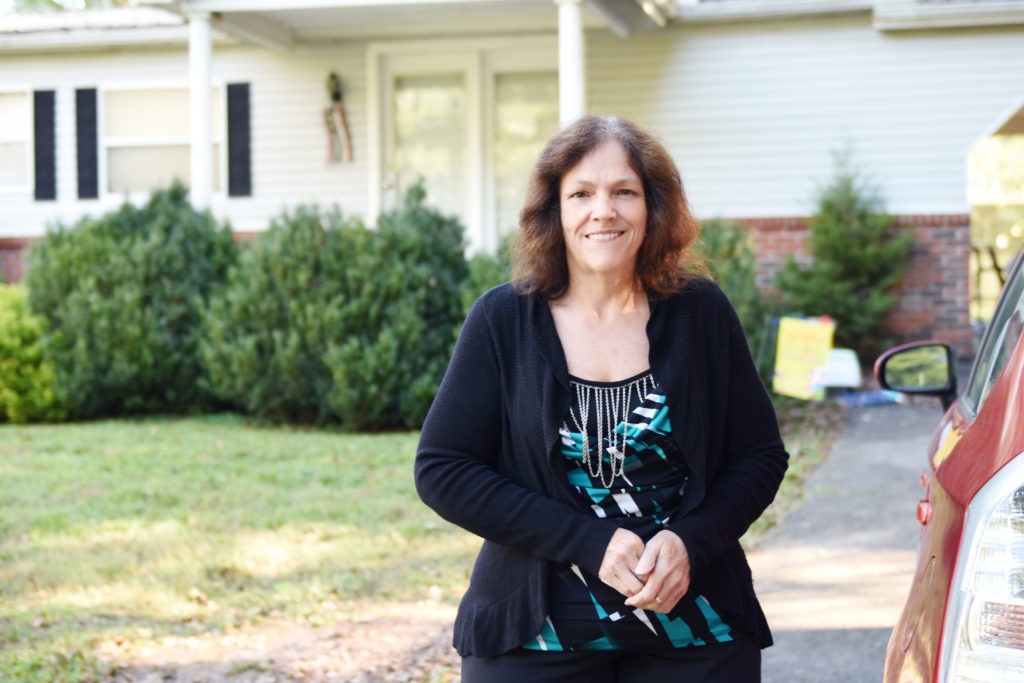
“The families that I work with are not hopeless,” Scarlette Jasper says. “Sometimes they feel helpless, but everyone needs a little help sometimes, I don’t care who you are or how much money you have.” Photo by Blake Tommey.
“Most of the individuals that I work with live paycheck to paycheck or they’re on Social Security or disability, so they have a limited income,” Jasper explains.
“When your resources are limited and something happens like your car breaks down or you have an unexpected medical bill that your insurance doesn’t cover, those things really put you behind, in paying your rent, in making your utility payments and things like that. You’re always having to determine what the priority is. What can I pay from this limited amount of funds that I have? What has to be done and what can I put off for a month or two? You’re always just one moment away from a financial disaster.”
It was high time to create some cushion between Jackson and the next disaster, starting with monthly meetings at Corbin’s First Baptist Church, where the two prioritized Jackson’s payday loan debt. Jasper coached her in creating monthly budgets that would allow her to slowly pay off her most outstanding debt and avoid prosecution. Next, they turned toward generating sustainable income for Jackson, whose health could no longer endure a full-time job. Jasper helped Jackson build her case for disability income, for which Jackson had to travel across Kentucky, and even to New York, tracking down her medical records. Jasper accompanied her to the Social Security Administration offices in Somerset and guided her through the convoluted filing procedure.
More importantly than even digging out of debt, the pair has consistently tended to Jackson’s emotional health, which had suffered enormously through years of mounting financial pressure.
“I felt burdened. I felt like I was sinking and I had no way out of it,” Jackson says. “You get in a rut and you just don’t want to do anything. You don’t want to function. You don’t want to deal with it. You don’t want to make the phone calls. You don’t want to tell somebody you need help. It’s very stressful.”
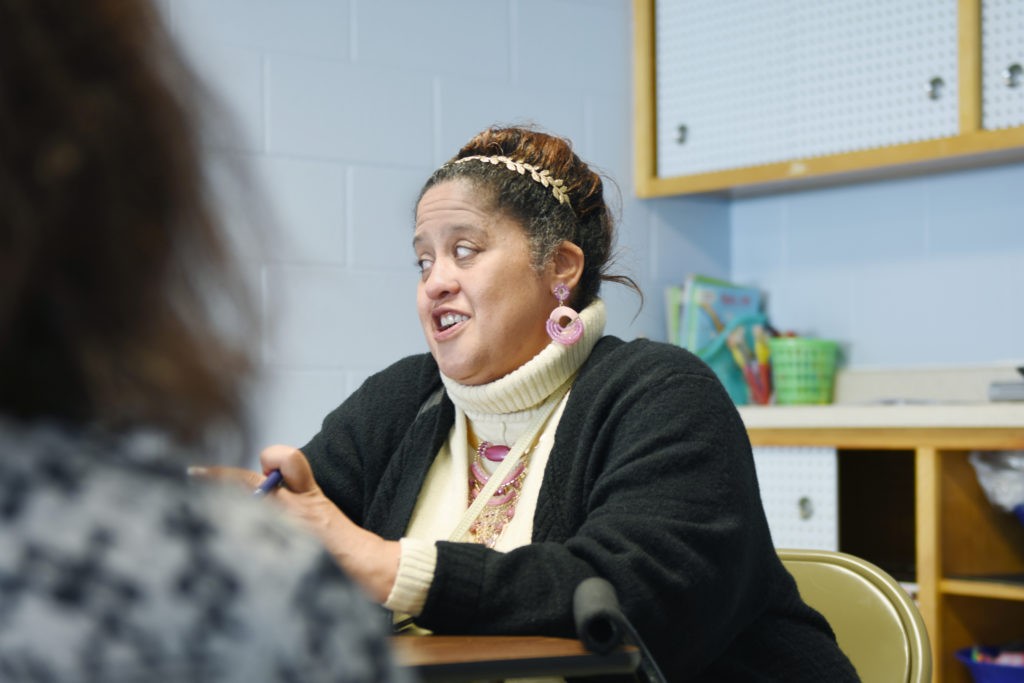
Glynda Jackson fell into debt over extensive medical bills and now struggles to navigate her income and federal benefits. With help from Scarlette Jasper, Jackson says her nose is nearly above water.
With her payday loans now behind her, Jackson is trending forward, thanks in part to unexpected windfall money from her disability claim. But the battle remains decidedly uphill. Her heart pacemaker must be replaced every seven to 10 years, and her spinal stimulator every five to seven. On top of that, Jackson’s disability claim, paired with income from a part-time job, disqualifies her for Medicaid. When she’s not working, she falls under the $16,000-a-year limit to qualify for Medicaid, yet still earns too much per month to enjoy a meaningful level of coverage. If she accepted Medicaid now, it would only pay her $134 monthly premium for Medicare — an abysmal tradeoff for remaining unemployed altogether.
Instead, she must forgo Medicaid and find a part-time job if she intends to chip away at her medical debt and afford the 20 percent of her healthcare for which she is responsible. The catch is, if she earns more than $1,180 a month in that job, she will lose her disability benefits.
Despite her catch-22, and the fact she will likely carry medical debt for the rest of her life, a strange calm has come over her, she explains. “I’m starting to be able to breathe. I’m still below water, but I’ve got my nose right there. I’m making progress.”
In the meantime, Jackson savors the companionship of her six best friends, all of whom network on behalf of each other in Corbin, she says. If one has extra groceries from the food pantry, she notifies the others and contributes her unwanted items. Likewise, if someone encounters an extra job opportunity or needs a babysitter. When it’s time to unwind from the constant barrage of maintaining income, she relaxes with her aunt, cousins and her 45 nieces and nephews.
Make no mistake, Jasper echoes, living through poverty is a barrage, one that nobody chooses and one that threatens your entire future if you don’t have help accessing the resources to which you are entitled. “Living in poverty is hard work and you have to spend so much time trying to access resources that may be available to you,” she explains. “People in poverty don’t just sit at home and watch TV.”
“They’re out trying to network and find resources that are available, to make sure that their family is taken care of. It’s a full-time job and it’s emotionally exhausting. You go to one place and find out you need to be somewhere else or you need different paperwork. Then you have to go to another county to access another resource, because that’s the only office in the region. Then you’re struggling to find out, how am I going to get there? And then, what am I going to do with my children? It’s truly a battle, every day.”
For Tamara Daffron, the battle ensued for years before she discovered her own rescue, again in a close mentorship with Jasper. Daffron and Jasper’s families grew up across the street from each other in Somerset and enjoyed a long-time friendship. Yet Jasper could only look on as Daffron’s unchecked bipolar disorder, ADHD and learning disability took over. Clothing and unused retail purchases piled up at home. Unpaid rent and utility bills swelled. Daffron’s debt deepened as she floated from job to job, unable to cope in a corporate environment. Two divorces, one from an abusive husband, intensified the turbulence.
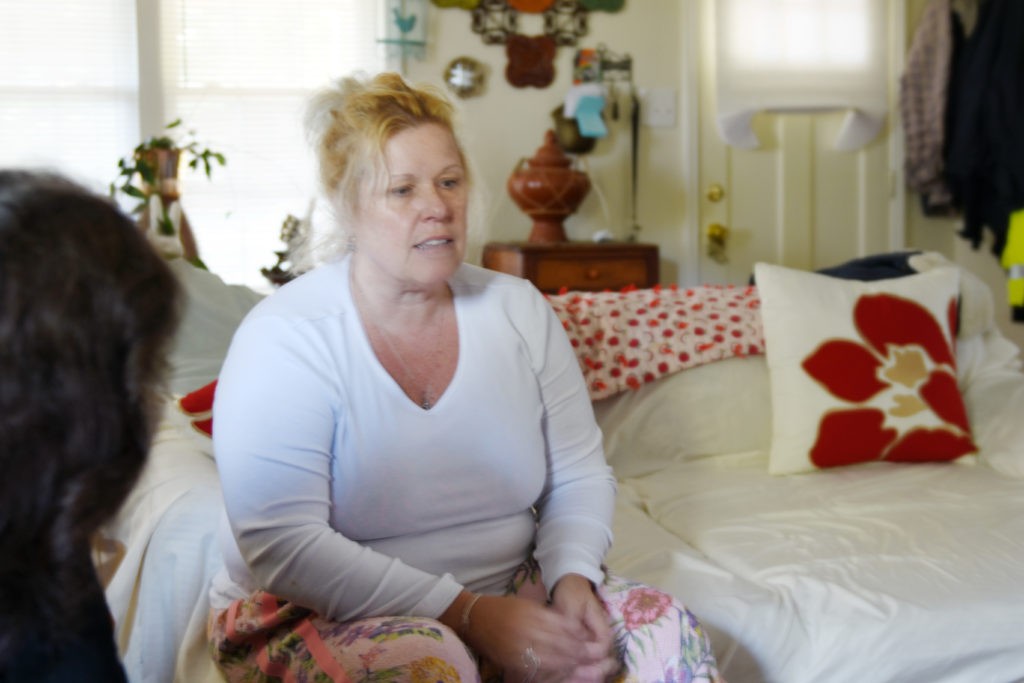
Tamara Daffron, a long-time friend of Scarlette Jasper, tells her story of overcoming disability and finding sustainable income.
Photo by Blake Tommey.
But Daffron’s disabilities had gone unresolved for years, she says. She recalls frequently being called on in her elementary school classes, where she learned to joke instead and became the class clown — anything to distract her peers from the fact that she couldn’t communicate the answers. “As I got older, I just kind of acted, fooled people,” she explains. “I avoided things I knew I couldn’t do or spell. I could have a conversation but not carry it to a point acceptable for corporate life. With the bipolar and all of that, it was hard to keep it together in a job, so I’ve had a lot of them.”
Despite her limitations, Daffron earned her certification as a nursing assistant and even got within six months of becoming a licensed practical nurse, thanks to instructors who would allow her to take oral tests instead of written. Just before taking her Fundamentals II exam, however, her instructor became ill and communication broke down between Daffron and the substitute. Consequently, she failed the test.
Daffron’s disability and depression had caused more than enough damage, so her mother and sister finally came to retrieve her from Somerset and seek medical help back in Cincinnati, her former home. Over the course of 14 years, Daffron’s mother accompanied her to multiple doctors and psychiatrists, all of whom had answers, but not the right ones, she says. “We were in and out because it was ‘schizophrenic’ and a lot of different diagnoses,” Daffron says.
“My mom would go with me and she was scared to death. I couldn’t blame her but that’s where we were and where we had to start, somewhere. We finally found Saint Elizabeth’s Behavioral Health and got me diagnosed. Dr. Davis did all the tests, neurological testing, and found out where I was. So finally, there was actual documentation and the family could see. They were like ‘Okay, we can see it and read it and it’s a fact, in black and white.’”
Eventually, Daffron was ready to return to Somerset and regain her independence, but this time, in close partnership with Jasper. During her first weeks back, Jasper even created an apartment for Daffron in her mission house just off Highway 27 until she could afford her own space. Like with Glynda Jackson, she helped her build a case for disability income, escorted her to the Social Security Administration office and guided her through the intricate online application. When Daffron qualified, Jasper became her payee. Each month, the two meet to establish a budget, ensure Daffron’s bills are paid properly and designate any remaining funds for savings or her two adult children.
More than anything, Daffron says, Jasper became a source of grace and love in the midst of profound grief for having to apply for assistance in the first place.
“How I felt when I went to that [Social Security] office, it was just devastating,” Daffron says. “She went with me to the testing and to an evaluation. I still have guilt for being on disability and I feel like it’s not my money. But I worked for it, so it is. Sometimes I think, I need to work, I need to contribute to society and I don’t want to take advantage of anything like that. That was not my purpose. But I know I can’t. The light started coming though, and the money is there and my bills are being paid through Scarlette. She takes care of all that.”
Daffron now works four hours a week with a cleaning service to supplement her disability income. She constantly quells the instinct to work more, she explains, but can’t legally exceed the federal income limits. “I’m a hard worker so the disability thing is still tough, but I would really be in trouble if I lost all my benefits. I’ve never had money like that though. Having it is just like ‘Wow.’ Even if it’s $20. That’s like a million.”
As Jasper continues her mentorship with Jackson, Daffron and a host of other individuals enduring insufficient income, their credit improves and provides a viable pathway out of debt and desperation. If individuals and families can become financially stable, Jasper explains, they can dedicate their energy to developing a sustainable future, where a new car, a better job or even a mortgage are finally possible. “Even when you’re applying for housing or getting a job, employers and landlords aren’t just looking at criminal backgrounds. They’re looking at your credit as well. It determines how much you pay in car insurance, how much your cell phone deposit is, so many different factors, and my work has really evolved toward this financial literacy component.”
Too often, Jasper explains, people in the United States see individuals like Glynda Jackson and Tamara Daffron and completely misjudge them. They associate low income or receiving eligible benefits with laziness as if living in poverty was a choice. “I don’t know anyone who would choose to live in poverty,” Jasper says.
Yet even poverty is not wrong or hopeless, she adds. At least those living in poverty have learned how to live in community, how to depend on others to sustain their life and, in turn, how to cultivate the kind of grace and empathy that helps others sustain their own lives.
“The people and families that I work with are not hopeless,” she says. “Sometimes they feel helpless. But everyone needs a little help sometimes. I don’t care who you are or how much money you have. Being in community and in fellowship with people, whether they’re in poverty or not, is important. We all need that. Families living in poverty are often made to feel like it’s wrong that they need a little help.
“It’s not wrong. We’re all here to be together and love one another.”
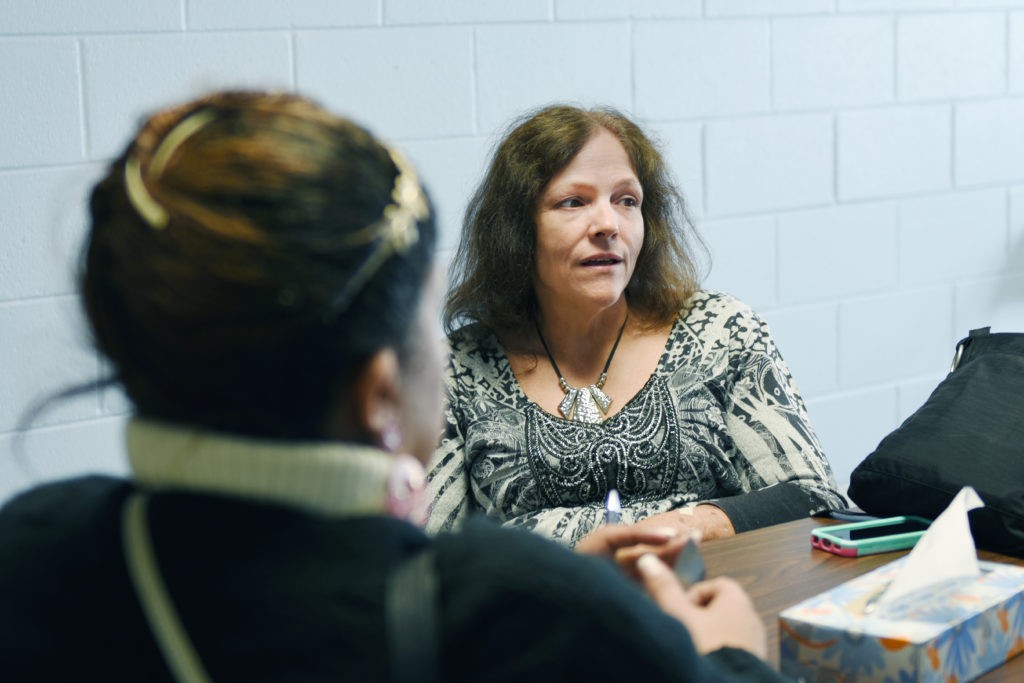
Scarlette Jasper, CBF field personnel, is trained in financial counseling and accessing resources for vulnerable individuals and families, including Social Security Disability, Medicaid and supplemental security income.
Photo by Blake Tommey.
Read more in the Southeast Kentucky series:
Living in poverty is hard work
Terrified yet courageous in the face of violence, Mountain Moms survive together
Southeast Kentucky: Enduring images
Photo Gallery: Southeast Kentucky
Video: Scarlette Jasper reflects on the compassion of a family in need
Video: Scarlette Jasper Reinterprets Rural Poverty
Video: What makes Glynda Jackson angry?
Video: Tamara Daffron finds stability through financial health mentorship
Related commentary at baptistnews.com:
Our disaster-relief success hasn’t moved the needle in addressing poverty. We need to ask why | Craig Nash
Reimagining churches as full-time partners with those in poverty | Laura Rector
Related news at baptistnews.com:
Interfaith partnerships, service to those in poverty and an ATM define Louisiana church
The endless work of combatting rural poverty can leave you in the dark, but hope flickers
This series in the “Resilient Rural America” project is part of the BNG Storytelling Projects Initiative. Has the United States forgotten its countryside? What strength and resilience may yet be stirring outside our city limits? In “Resilient Rural America,” we attempt to answer these questions when we visit these unique communities to examine the singular nature of poverty in rural America and tell the stories of development among its courageous and resilient people.
_____________
Seed money to launch our Storytelling Projects initiative and our initial series of projects has been provided through generous grants from the Christ Is Our Salvation Foundation and the Eula Mae and John Baugh Foundation. For information about underwriting opportunities for Storytelling Projects, contact David Wilkinson, BNG’s executive director and publisher, at [email protected] or 336.865.2688.

